ACM MemberNet - July 28, 2022
Welcome to the July 2022 edition of ACM MemberNet—Special Awards Banquet Edition.
The ACM Awards Banquet is an annual event recognizing technical excellence and outstanding service to the computing field. This year's banquet honoring the 2021 award recipients and newly inducted ACM Fellows was held at the Palace Hotel in San Francisco on June 11.
ACM's awards celebrate our long tradition of honoring those whose contributions have impacted our world for the better in countless ways. These prestigious and internationally recognized honors are an integral part of ACM's mission to unite computing educators, researchers, and professionals to inspire dialogue, share resources, and address the field's challenges.
View our photo album of the banquet here.
View our awards video playlist here, highlighting the 2021 award recipients' work, research, and contributions to the field of computing.
AWARDS PRESENTED AT ACM's 75TH ANNIVERSARY CELEBRATION:
- ACM A.M. Turing Award
- ACM Prize in Computing
- ACM Frances E. Allen Award for Outstanding Mentoring
- ACM - AAAI Allen Newell Award
- Software System Award
- Grace Murray Hopper Award
- Paris Kanellakis Theory and Practice Award
- ACM Policy Award
- Karl V. Karlstrom Outstanding Educator Award
- Distinguished Service Award
- Athena Lecturer Award
- ACM Presidential Award
- Doctoral Dissertation Award
- 2021 ACM Fellows
ACM AWARD NOMINATIONS
ACM ADVANCED MEMBER GRADES
ACM AWARDS BANQUET
ACM A.M. Turing Award
The ACM A.M. Turing Award was presented to Jack J. Dongarra for pioneering contributions to numerical algorithms and libraries that enabled high-performance computational software to keep pace with exponential hardware improvements for over four decades. Learn more about Dongarra's expansive career and the specifics, significance, and enduring impact of his past and present work on a wide range of modern computer systems in this short video.
Accompanied by a prize of $1,000,000, ACM's most prestigious award is given to recognize contributions of a technical nature which are of lasting and major technical importance to the computing field. Financial support of the A.M. Turing Award is provided by Google Inc.
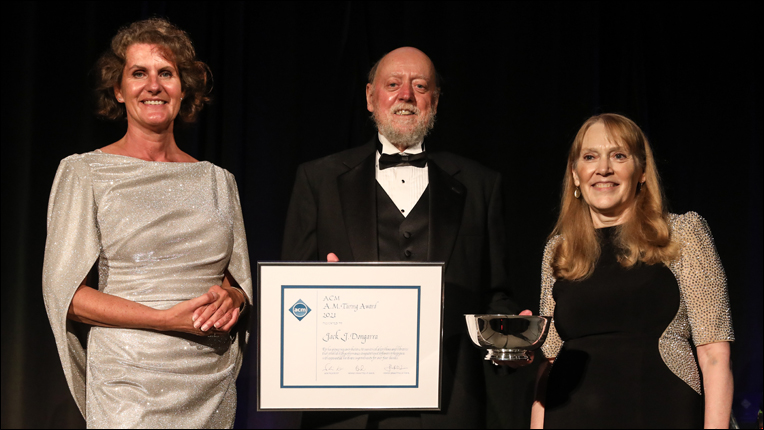
Turing Award recipient Jack J. Dongarra with ACM President Gabriele Kotsis and ACM CEO and Executive Director Vicki L. Hanson
ACM Prize in Computing
The ACM Prize in Computing was presented to Pieter Abbeel for contributions to robot learning, including learning from demonstrations and deep reinforcement learning for robotic control. Learn more about Abbeel's work with robotics and AI, his development of few-shot imitation learning, and the potential for robots to learn by themselves in this short video.
The ACM Prize in Computing recognizes an early- to mid-career fundamental innovative contribution in computing that, through its depth, impact and broad implications, exemplifies the greatest achievements in the discipline. The award carries a prize of $250,000. Financial support is provided by Infosys Ltd.
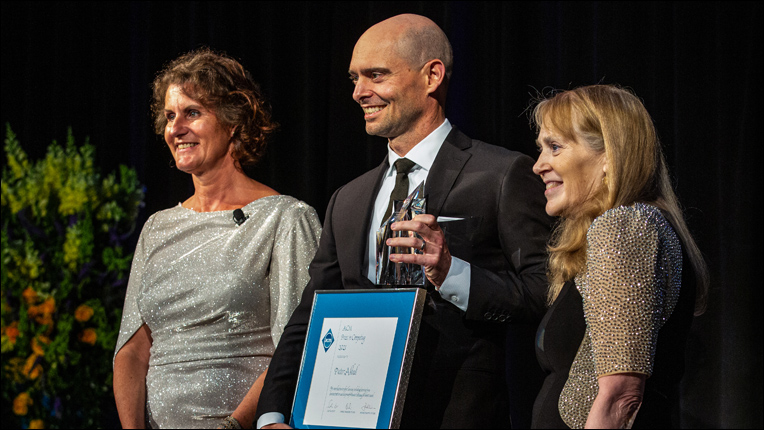
ACM Prize recipient Pieter Abbeel with Gabriele Kotsis and Vicki L. Hanson
ACM Frances E. Allen Award for Outstanding Mentoring
The ACM Frances E. Allen Award for Outstanding Mentoring was presented to Carla E. Brodley for significant personal mentorship and leadership in creating systemic programs that have increased diversity in computer science by creating mentoring opportunities for thousands at Northeastern University and other universities across the United States. Learn more about Brodley's data-driven mentoring practices, her efforts to increase the participation of historically marginalized people, and her founding of the Center for Inclusive Computing in this short video.
The ACM Frances E. Allen Award for Outstanding Mentoring is presented biennially to an individual who has exemplified excellence and/or innovation in mentoring with particular attention to recognition of individuals who have shown outstanding leadership in promoting diversity, equity, and inclusion in computing. The award is accompanied by a prize of $25,000 to the awardee with an additional $10,000 cash contribution to an approved charity of the awardee’s choice with financial support by Microsoft Research.
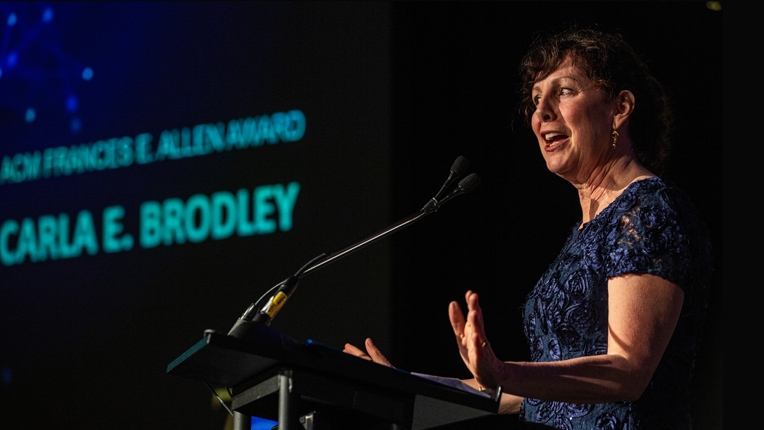
ACM Frances E. Allen Award recipient Carla E. Brodley
ACM - AAAI Allen Newell Award
The ACM - AAAI Allen Newell Award was presented to Carla Gomes for establishing and nurturing the field of computational sustainability and for foundational contributions to artificial intelligence. Learn more about Gomes' achievements in her field, the mutual enrichment of computer science and sustainability, and how her research has involved both natural and man-made resources in this short video.
The award is named for Allen Newell, a trailblazer in computer science research and education, and a founder of the artificial intelligence and cognitive science fields. The Newell Award is presented to individuals selected for career contributions that have breadth within computer science, or that bridge computer science and other disciplines. It is accompanied by a $10,000 prize provided by ACM and the Association for the Advancement of Artificial Intelligence, and by individual contributions.
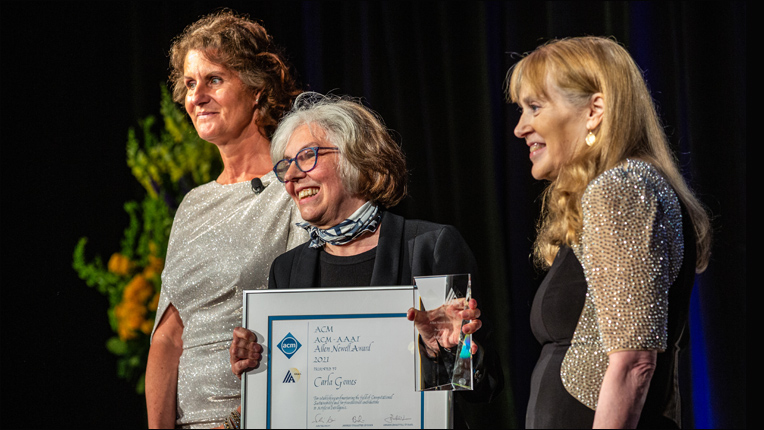
ACM Newell Award recipient Carla Gomes with Gabriele Kotsis and Vicki L. Hanson
Software System Award
The Software System Award was presented to Xavier Leroy, Sandrine Blazy, Zaynah Dargaye, Jacques-Henri Jourdan, Michael Schmidt, Bernhard Schommer, and Jean-Baptiste Tristan for the development of CompCert, the first practically useful optimizing compiler targeting multiple commercial architectures that has a complete, mechanically checked proof of its correctness. Learn more about how CompCert was conceived, what it can do, and how it has led to a new age in verification in this short video.
The Software System Award is presented to an institution or individuals recognized for developing a software system that has had a lasting influence, reflected in contributions to concepts, in commercial acceptance, or both. A prize of $35,000 accompanies the award, with financial support provided by IBM.
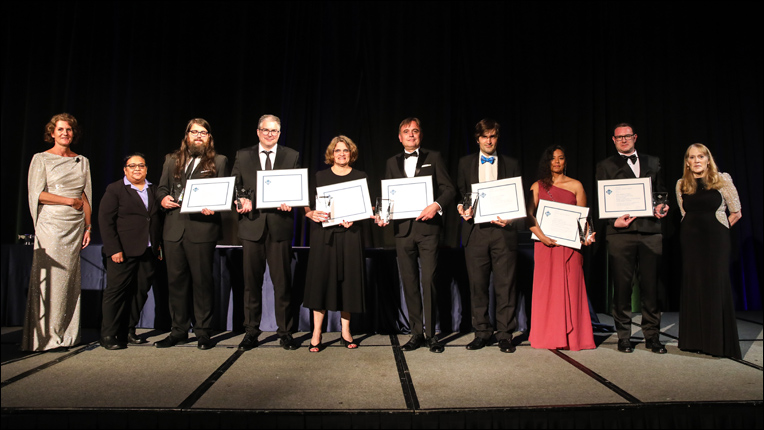
Software System Award recipients Bernhard Schommer, Michael Schmidt, Sandrine Blazy, Xavier Leroy, Jacques-Henri Jourdan, Zaynah Dargaye, and Jean-Baptiste Tristan with Gabriele Kotsis, Tanveer Syeda-Mahmood (IBM Research), and Vicki L. Hanson
Grace Murray Hopper Award
The Grace Murray Hopper Award was presented to Raluca Ada Popa, for the design of secure distributed systems. The systems protect confidentiality against attackers with full access to servers while maintaining full functionality. Learn more about how Popa combined specialized crytographic, privacy-preserving constructs with a smart building-block system approach to promote safe and secure computation in this short video.
The award is named for Admiral Grace Murray Hopper, a pioneer in software development whose work spanned programming languages, software development concepts, compiler validation, and data processing. The Hopper Award is presented to the outstanding young computer professional of the year, selected on the basis of a single recent major technical or service contribution. The candidate must have been 35 years of age or less at the time the qualifying contribution was made. A prize of $35,000 accompanies the award, with financial support provided by Microsoft Research.
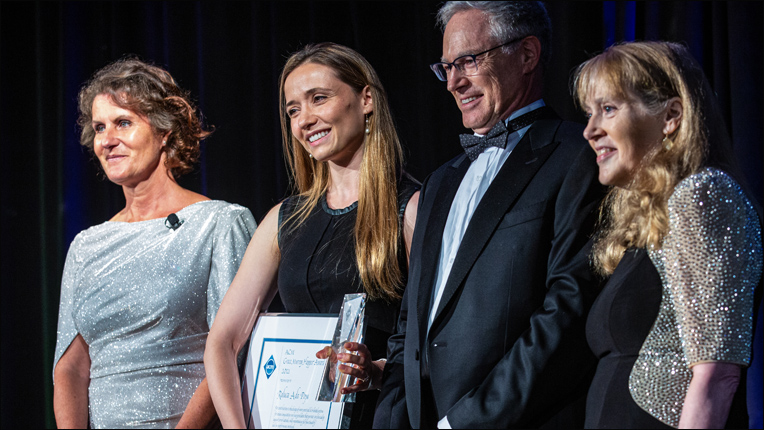
Hopper Award recipient Raluca Ada Popa with Gabriele Kotsis, Eric Horvitz, and Vicki L. Hanson
Paris Kanellakis Theory and Practice Award
The Paris Kanellakis Theory and Practice Award was presented to Avrim Blum, Irit Dinur, Cynthia Dwork, Frank McSherry, Kobbi Nissim, and Adam Davison Smith for their fundamental contributions to the development of differential privacy. Learn more about how the recipients' series of papers introduced the theory of differential privacy, what it offers, and how it can be used in a wide range of applications in this short video.
The award is named for Paris Christos Kanellakis, who, as a distinguished computer science theoretician and esteemed faculty member of Brown University, focused much of his work in the area of theoretical computer science, particularly the principles of database systems and logic. The Kanellakis Award honors specific theoretical accomplishments that have had a significant and demonstrable effect on the practice of computing. It is accompanied by a prize of $10,000 and is endowed by contributions from the Kanellakis family, and financial support by ACM's Special Interest Groups SIGACT, SIGDA, SIGMOD, and SIGPLAN, the ACM SIG Project Fund, and individual contributions.
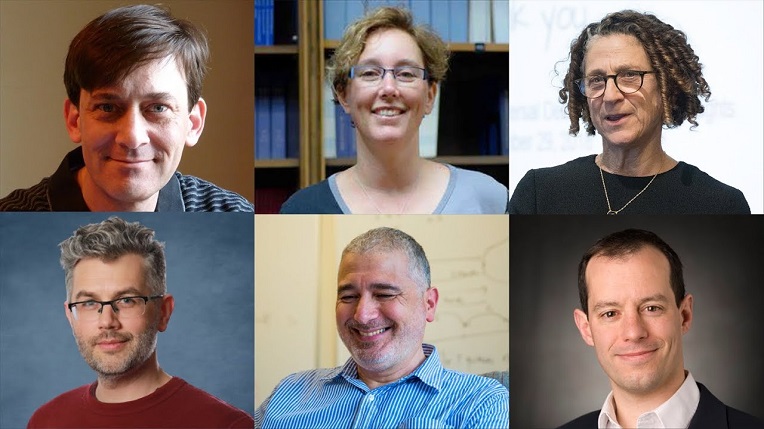
Kanellakis Award recipients Avrim Blum, Irit Dinur, Cynthia Dwork, Frank McSherry, Kobbi Nissim, and Adam Davison Smith
ACM Policy Award
The ACM Policy Award was presented to Judy Brewer for her leadership of the Web Accessibility Initiative (WAI) and development of multiple web accessibility standards, which have been adopted globally and improved accessibility for millions worldwide. Learn more about Brewer's work in the WAI, the creation of the Web Content Accessibility Guidelines, and how her efforts have helped change countless lives in this short video.
The ACM Policy Award was established in 2014 to recognize an individual or small group that had a significant positive impact on the formation or execution of public policy affecting computing or the computing community. This can be for education, service, or leadership in a technology position; for establishing an innovative program in policy education or advice; for building the community or community resources in technology policy; or other notable policy activity. The award is accompanied by a $10,000 prize.
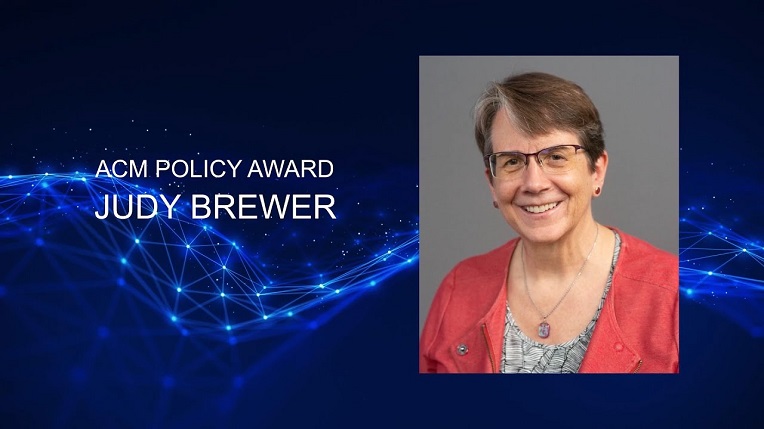
Policy Award recipient Judy Brewer
Karl V. Karlstrom Outstanding Educator Award
The Karl V. Karlstrom Outstanding Educator Award was presented to Mark Allen Weiss for advancing the art and science of CS education through his textbooks, research, and curriculum design, which have affected thousands of instructors as well as students around the world. Learn more about Weiss' decades-long efforts to make CS studies more viable and open and his guidance of overall CS education in this short video.
The Karlstrom Award is presented annually to an outstanding educator who is appointed to a recognized educational baccalaureate institution; recognized for advancing new teaching methodologies; effecting new curriculum development or expansion in computer science and engineering; or making a significant contribution to ACM's educational mission. Those teachers with 10 years or less experience are given special consideration. The Karlstrom Award is accompanied by a prize of $10,000, with financial support provided by Pearson Education.
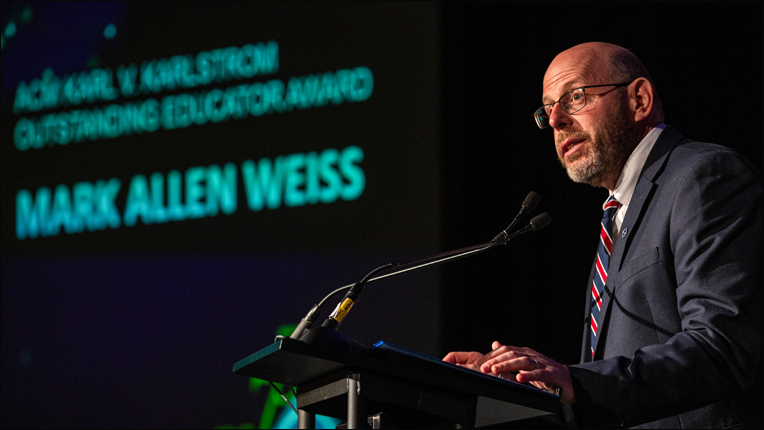
Karlstrom Award recipient Mark Allen Weiss
Distinguished Service Award
The Distinguished Service Award was presented to Erik Altman for leadership in the computer architecture communities, and for contributions to ACM's organizational development. Learn more of Altman's work to connect AMC's SIG communities, his efforts to engage members with daily news feeds that led to the creation of ACM TechNews, and his career in industrial computer research in this short video.
The Distinguished Service Award is given on the basis of value and degree of service to the computing community. The contributions are not limited to service to the Association, and should include activities in other computer organizations and should emphasize contributions to the computing community at large.
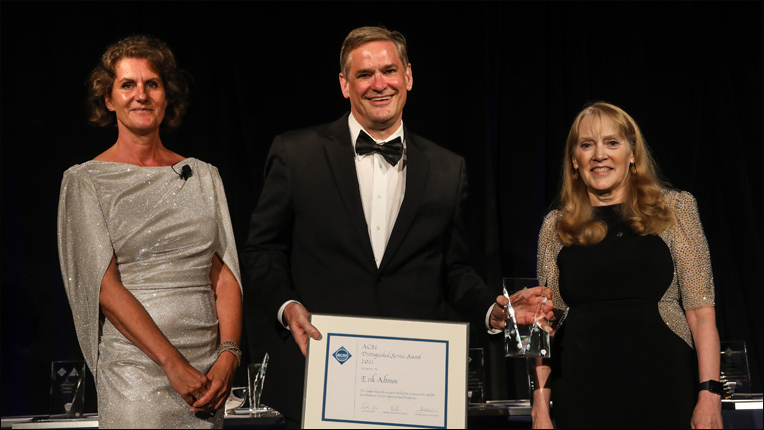
Distinguished Service Award recipient Erik Altman with Gabriele Kotsis and Vicki L. Hanson
ACM Athena Lecturer Award
The ACM Athena Lecturer Award was presented to Éva Tardos for pioneering and impactful contributions to data management and data security theory and systems, along with outstanding contributions to broadening participation in computing via professional leadership and mentoring. Learn more about Tardos' extensive work in the field of algorithms, using game theoretic ideas to quantify performance gaps, and her teaching career in this short video.
The ACM Athena Lecturer Award recognition celebrates women researchers who have made fundamental contributions to computer science. The award carries a cash prize of $25,000, with financial support provided by Two Sigma. The recipient gives an invited talk at a major ACM conference of her choice.
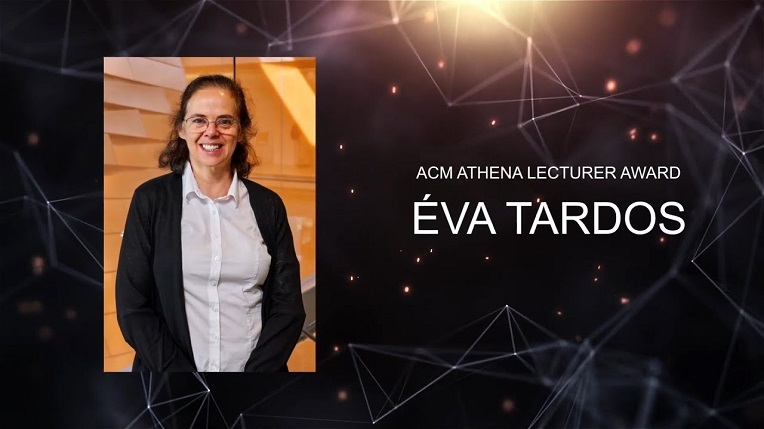
Athena Lecturer Award recipient Éva Tardos
ACM Presidential Award
The ACM Presidential Award was presented to Dame Wendy Hall for her technical contributions that have significantly influenced the development of the Semantic Web and the field of Web Science; her leadership and impact in shaping the science and engineering policy agenda internationally; her advocacy and leadership in promoting informatics education throughout Europe through the Informatics for All coalition and other international groups; and her committed and inspired work to strengthen ACM's geographically diverse footprint and establishing and fostering regional councils to promote ACM activities in China, India, and Europe. Learn more about Hall's early career and her influence in the global computing community in this short video.
This award is given at the discretion of the ACM President, to individuals whose contributions in computing fall within the goals of the ACM.
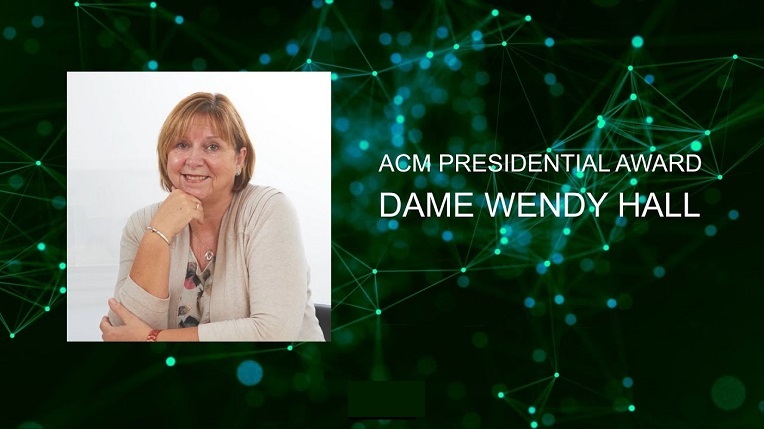
ACM Presidential Award recipient Dame Wendy Hall
Doctoral Dissertation Award
The Doctoral Dissertation Award was presented to Manish Raghavan is the recipient of the 2021 ACM Doctoral Dissertation Award for his dissertation, "The Societal Impacts of Algorithmic Decision-Making."
Honorable Mentions go to Dimitris Tsipras for his dissertation "Learning Through the Lens of Robustness," Pratul Srinivasan for his dissertation "Scene Representations for View Synthesis with Deep Learning," and Benjamin Mildenhall for his dissertation "Neural Scene Representations for View Synthesis."
The Doctoral Dissertation Award is presented annually to the author(s) of the best doctoral dissertation(s) in computer science and engineering. The award is accompanied by a prize of $20,000 and the honorable mention is accompanied by a prize totaling $10,000. Winning dissertations will be published in the ACM Digital Library as part of the ACM Books Series.
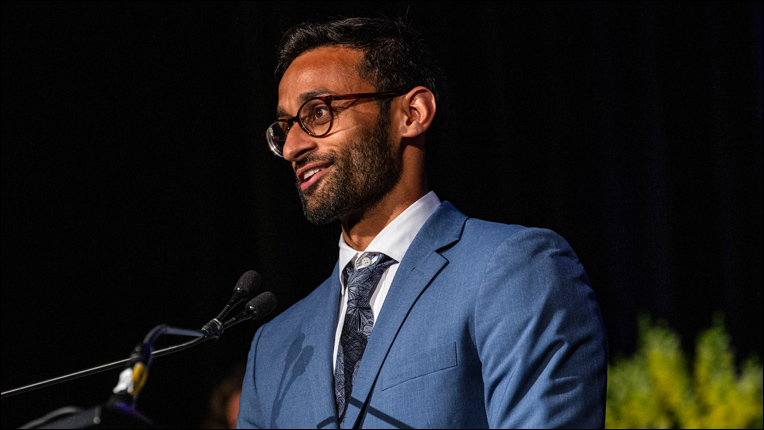
Doctoral Dissertation Award recipient Manish Raghavan
2021 ACM Fellows
The ACM Fellows Program was established in 1993 to recognize and honor outstanding ACM members for their achievements in computer science and information technology and for their significant contributions to the mission of ACM. The ACM Fellows serve as distinguished colleagues to whom ACM and its members look for guidance and leadership as the world of information technology evolves.
The 2021 Fellows are:
- Leonard Adleman, Retired
- David A. Bader, New Jersey Institute of Technology
- Meenakshi Balakrishnan, Indian Institute of Technology, Delhi
- Nikolaj Bjorner, Microsoft Research
- Mark Braverman, Princeton University
- Linda Jean Camp, Indiana University
- Edward Y. Chang, Stanford University
- Tanzeem Choudhury, Cornell Tech
- Daniel Cohen-Or, Tel Aviv University
- Gautam Das, University of Texas at Arlington
- Anind Dey, Information School, University of Washington
- Lieven Eeckhout, Ghent University
- Martín Farach-Colton, Rutgers University
- Amos Fiat, Tel Aviv University
- Hubertus Franke, IBM Research
- Batya Friedman, University of Washington
- Evgeniy Gabrilovich, Google
- Judith Gal-Ezer, Open University of Israel
- Deepak Ganesan, University of Massachusetts Amherst
- Anupam Gupta, Carnegie Mellon University
- Zygmunt J. Haas, University of Texas at Dallas
- Elad Hazan, Princeton University
- Xiaobo Sharon Hu, University of Notre Dame
- Paola Inverardi, University of L’Aquila
- Zachary Ives, University of Pennsylvania
- Sushil Jajodia, George Mason University
- Ranjit Jhala, University of California San Diego
- David R. Kaeli, Northeastern University
- Jonathan Katz, University of Maryland
- Robert Kleinberg, Cornell University
- Thomas Lengauer, Max Planck Society
- Hai “Helen” Li, Duke University
- Feifei Li, Alibaba Cloud
- Ninghui Li, Purdue University
- Tie-Yan Liu, Microsoft Research Asia
- Steve Marschner, Cornell University
- Matthew T. Mason, Carnegie Mellon University
- Dale A. Miller, Inria Saclay
- Elchanan Mossel, MIT
- Bernhard Nebel, Albert-Ludwigs Universität
- Rafail Ostrovsky, UCLA
- Joël Ouaknine, Max Planck Institute for Software Systems
- David Z. Pan, The University of Texas at Austin
- Rosalind W. Picard, MIT Media Lab
- Shaz Qadeer, Novi, Meta
- Glenn Ricart, US Ignite
- Tajana Rosing, University of California San Diego
- Robert B. Ross, Argonne National Laboratory
- Szymon Rusinkiewicz, Princeton University
- Pierangela Samarati, Università degli Studi di Milano, Italy
- Sunita Sarawagi, IIT Bombay
- Bernt Schiele, MPI for Informatics/Saarland University
- Mubarak Ali Shah, University of Central Florida
- Alla Sheffer, University of British Columbia
- Munindar P. Singh, North Carolina State University
- Aravinda Prasad Sistla, University of Illinois Chicago
- Scott Smolka, Stony Brook University
- Jie Tang, Tsinghua University
- Mark Tehranipoor, University of Florida
- Luca Trevisan, Bocconi University
- Wenping Wang, Texas A&M University
- Brent Waters, University of Texas Austin & NTT Research
- Ryen W. White, Microsoft Research
- Jacob O. Wobbrock, University of Washington
- Tao Xie, Peking University
- Ming-Hsuan Yang, University of California Merced, Google, Yonsei University
- Mohammed Zaki, Rensselaer Polytechnic Institute
- Ben Yanbin Zhao, University of Chicago
- Lin Zhong, Yale University
- Shlomo Zilberstein, University of Massachusetts at Amherst
- Thomas Zimmermann, Microsoft Research
View the complete listing of ACM Fellows.
ACM AWARD NOMINATIONS
Call for ACM Award Nominations
Each year, ACM recognizes technical and professional achievements within the computing and information technology community through its celebrated Awards Program. The first, most vital step in the process is the nomination of candidates whose work exemplifies the best and most influential contributions to our community, and society at large. ACM seeks your help in generating nominations for our 2022 Awards.
As you contemplate who might be nominated for various ACM awards, please consider ACM’s commitment to diversity, equity and inclusion. This commitment includes multiple aspects of diversity such as age, race and ethnicity, gender and sexual orientation, nationality, physical ability, thinking style, and experience. We encourage all potential nominators to take these factors into consideration when nominating. Candidates need not be ACM members to be nominated.
Please forward the ACM Awards Call for Nominations to your network through distribution lists, related organizations, and individual contacts to help ensure that deserving candidates are nominated.
ACM's award committees evaluate the contributions of candidates for various awards that span a spectrum of professional and technological accomplishments. For awards presented at the annual June banquet, the deadline for award nominations is December 15, 2022. Refer to the award nominations page for nomination guidelines and the complete listing of Award Subcommittee Chairs and Members.
ACM ADVANCED MEMBER GRADES
Advanced Member Grades Nominations Information
The Senior Member advanced grade of membership recognizes ACM members with at least 10 years of professional experience and 5 years of continuous ACM Professional membership. Nominations are accepted on a quarterly basis. The deadline for nominations is September 3.
The Distinguished Member designation recognizes ACM members with at least 15 years of professional experience and 5 years of continuous ACM Professional membership who have demonstrated significant accomplishments or made a significant impact on the computing field. The deadline for nominations is August 1.
Fellow is ACM's most prestigious member grade recognizing the top 1% of ACM members for their outstanding accomplishments in computing and information technology and/or outstanding service to ACM and the larger computing community. The deadline for nominations is September 7.
Copyright © 2022, ACM, Inc.